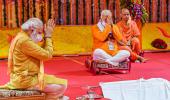'Why can't the Supreme Court say that secularism is part of the basic structure of the Constitution, and therefore, steps must be taken to operationalise it?'

"Hardly any action is taken against leaders of political parties making hate speeches. Unless the law is trained to disqualify a person from contesting the election for making hate speeches, there will be no effective check on this sensitive issue," says Dr Madhav Godbole, who resigned as Union home secretary in the aftermath of the Babri Masjid demolition.
Dr Godbole, who has written 26 books on Indian policy issues since he bid farewell to the Indian Administrative Service in 1993, has just published his latest book India - A Federal Union of States - Fault Lines, Challenges and Opportunities (Konark Publishers).
"I fail to understand why the Supreme Court has not given a direction so far to operationalise secularism," Dr Godbole tells Rediff.com's Archana Masih in the second part of a lively conversation.
In your book you say that though secularism is part of the basic structure of the Constitution, secularism has not been operationalised. What threat does it pose to India and Indian federalism?
All those advocating a Hindu Rashtra must realise that rashtra is a much larger concept and a Hindu Rashtra cannot consist of Hindus alone. It can be a mix of different religions that constitute India.
Secondly, there hasn't been a real commitment to secularism by successive governments over the years in spite of the Supreme Court ruling that it is part of the basic structure of the Constitution. Secularism has not been operationalised.
I fail to understand why the Supreme Court has not given a direction so far to operationalise secularism.
Meanwhile, the Supreme Court has declared a number of rights as fundamental rights, even those which are not mentioned in the Constitution, like the right to privacy, right to information.
There are 8-10 rights that been recognised by the Supreme Court as fundamental rights though they are not explicitly mentioned in the Constitution.
Similarly, why can't the Supreme Court say that secularism is part of the basic structure of the Constitution, and therefore, steps must be taken to operationalise it?
Thirdly, the minimum that a government can do is to bring a law which says that a candidate should get 50% plus 1 vote to be declared a winner in an election.
S/he will then represent the majority in the real sense of the term and her/his appeal will not be limited to her/his own caste, creed, community, religion, etc.
The candidate will have to make an appeal to various sections of society and that will be real representative democracy.
Fourthly, hardly any action is taken against leaders of political parties making hate speeches.
Unless the law is trained to disqualify a person from contesting the election for making hate speeches, there will be no effective check on this sensitive issue.
It needs statesmanship amongst all political parties to come together and make a Constitutional amendment and also amend the Representation of People Act to debar the mixing of religion and politics.
For example, why should political parties have flags which are so common to their own religions? The Election Commission of India should not have permitted such flags by some regional parties.
These is a very large, complex, complicated and sensitive subject, but it will require real statesmanship.
- Part III: 'Governorships should be abolished'
Feature Presentation: Aslam Hunani/Rediff.com











 © 2025
© 2025